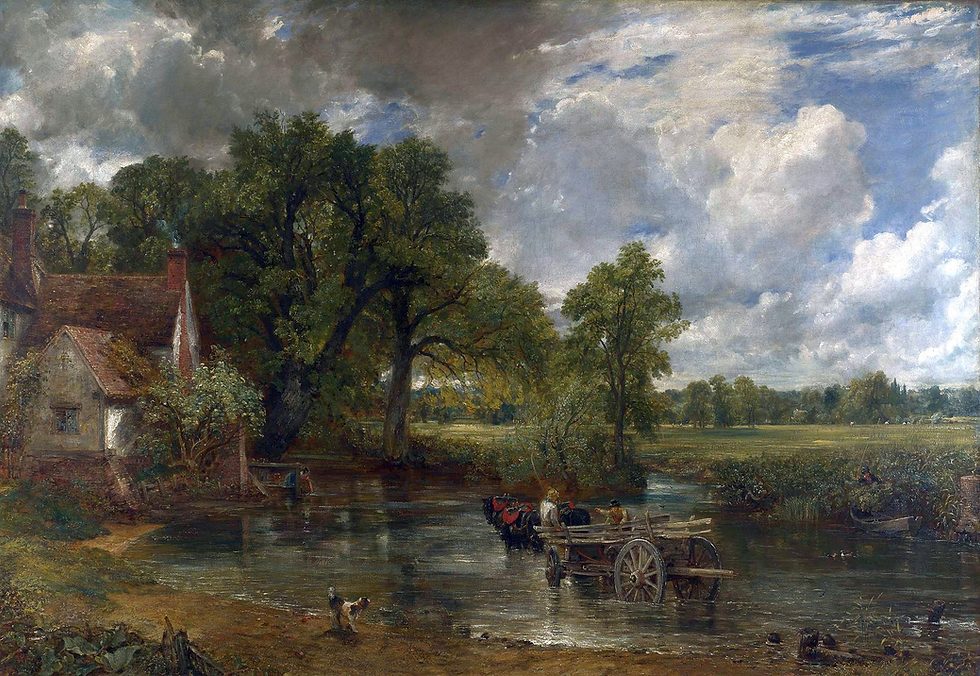How to Turn Your Life into Poetry
- Adam Gary

- Oct 3, 2021
- 5 min read
Updated: Dec 12, 2021


Tuesday morning, you wake up naturally as the first beams of morning light stain your face. You get out of bed with a smile in your long white linen dress and your fingers slowly begin to untangle your braid leaving your hair in soft waves that cascade down your shoulders. Making your way to the kitchen, you walk past the dozens of potted plants you’ve spent precious months cultivating, and are greeted in the hallway by your cat and dog. There’s fresh fruit on the kitchen table, a crisp breeze blowing in through the window, and paint tubes scattered across the countertops. You make yourself a pot of coffee, and sip silently in the garden. It’s just another Tuesday.

The concept of romanticizing your life or “being the main character” has been a trend on social media over the past year. It is characterized by finding joy in the little things in life, living in the moment, and living as though you are a character in a movie that you write, direct, and star in. The trend has a seductive and idyllic nature, and I must admit that it is something I myself have been quite taken with and try to apply the principles to my everyday life. There is something profoundly beautiful about living a life that focuses on appreciating nature, walks, and cups of tea as opposed to the overly political and consumerism-driven nature of mainstream culture.

Yet, with all this being said, I still can’t help but notice that social media posts promoting these trends tend to be ubiquitously naive to the fact that sometimes life isn’t all that great, and tend to portray overly picturesque vignettes like the previously mentioned, It's just another Tuesday. And while on paper saying that everyone should just find beauty in the simple things is a good idea, in practice, it is a little more complicated than that. This isn’t to say that there is no utility at all in romanticizing your life, I just believe that there is a way that we can do it without suspending belief in one of the most fundamental laws governing the universe - sometimes, shit happens.
Romanticism is not just another love child of TikTok and Instagram, in fact it is an entire movement that stems all the way back to the 18th century. Wikipedia provides the following short summary of it:
Romanticism (also known as the Romantic era) was an artistic, literary, musical, and intellectual movement that originated in Europe towards the end of the 18th century, and in most areas was at its peak in the approximate period from 1800 to 1850. Romanticism was characterized by its emphasis on emotion and individualism as well as glorification of all the past and nature, preferring the medieval rather than the classical. It was partly a reaction to the Industrial Revolution, the aristocratic social and political norms of the Age of Enlightenment, and the scientific rationalization of nature—all components of modernity. It was embodied most strongly in the visual arts, music, and literature, but had a major impact on historiography, education, chess, social sciences, and the natural sciences. It had a significant and complex effect on politics, with romantic thinkers influencing liberalism, radicalism, conservatism, and nationalism.

Romanticism as a philosophical and artistic movement places strenuous focus on individual emotions and experiences, and places great importance on aesthetics. And while I believe social media has the latter part down, it could use a little help in the former. Though romantic social media posts tend to be beautiful and well made, the message that calls for the emotional side of the concept is often lacking. There tends to be little attention paid to introspection and the complete dismissal of anything potentially negative. Though by neglecting the trials and tribulations life often carries with it, influencers are ignoring one of the most crucial parts of the human experience. Rather than pushing negative emotions to the side or simply labelling them as “bad”, I believe that negative feelings should be viewed in equally high regard as positive ones for not only do they serve a necessary psychological purpose, but there is also beauty to be found in them.

Not only can negative emotions serve as an impetus for change or an opportunity for self reflection, but I believe that they are the key to intimacy, and intimacy is the key to good writing. To show what I mean, let’s take a look at relationships. I would argue that the path to intimacy in relationships is actually the not so good parts about who you are or what you’ve been through. It is incredibly easy to speak to almost anybody about the good things, your accomplishments, the things you love, but this doesn’t really help you develop a deep connection with anyone. It takes a certain level of vulnerability and opening up about the not so great things - your fears, insecurities, your baggage in order to form a truly intimate relationship with another person. Now try to think about the writer/reader relationship as a similar exchange. By imbuing your work with a sense of vulnerability, your readers will form a deeper connection to it. So don’t be in such a rush to get rid of negative emotions, sadness, or heartbreak as soon as they come to you, for they are the currency with which you build meaningful relationships with your readers as well as people in your personal life. And don’t be afraid to take risks in life even if it might result in heartache or pain because ultimately it will make you a better writer. I don’t know if you’ve ever experienced this, but for me, some of the most cherished memories I have with others have been moments of bonding following often tearful heart to hearts, and I find it helpful to tap into that energy as I’m writing.

Does this all mean that I think we should stop finding beauty in the little things and instead focus all of our energy on becoming nihilistic pessimism? Of course not (unless that’s your thing). What I am saying though, is that finding beauty in simple everyday occurrences goes beyond the aesthetic cup of coffee you had for breakfast this morning, and requires some actual introspection and emotional work on your part. It also means not turning a blind eye to any part of your psyche - be it good, bad, or neutral. Doing this will not only make your life more fulfilling and give you a deeper understanding of who you are as a person, but it will also make you a better poet in the end.
William Wordsworth said that poetry should begin as "the spontaneous overflow of powerful feelings, which the poet should then recollect in tranquility". As an exercise, I would urge you to make it a habit of analyzing and pondering over all that you feel in a day, and using what you discover to fuel your poetry. The good, the bad, the ugly. Whatever another Tuesday looks like for you.











Your posts may appear to be the most in depth.Probably because I had to read couple more times to understand what this post was trying to say.
Such as all ideas,appear great,until they execute.I always wonder why social media appears fabricated and lack of introspection has something to do with this.
In personal development circles this idea gets thrown alot.Idea that we star in this movie call "My Life" and we have to make this as amazing as possible.Not always true.Sometimes,the movie has sequels and third.Sometimes its a stand alone.And depending on where someone is in life,they are either in 1st(0-31) 2nd (32-63) or 3rd (63-100) act of movie.
Being nihilistic might be most realistic form but also harmful due…
This holds so much meaning to me and I'm taking back so much from this post. I always tend to push aside 'bad' emotions and try to focus on the good but I've come to the realisation that there's honesty in those vulnerable moments. And like you mentioned it's the vulnerability and honesty that'll bring in a bond between a writer and a reader. This was a great read! x
This is a beautifully written segment, Sophie. I love your writing, you have a natural, alluring essence. I like the notion of forming stronger bonds of intimacy with your readers by allowing vulnerability to front. Also negative emotions do feel like overwhelming clutter, nice thought -to channel these feelings instead, to connect, to create a space for readers to relate. I must admit I know very little about Romanticism, it's an intriguing idea. As was this piece. You know, frankly I don't Romanticise my life enough.
Another great blog post Sophie! And I'm sorry but that opening paragraph is a work of art in itself! So vivid! I am inspired now to post when I am feeling down to social media as much as I am feeling happy, and to make that as 'artsy' as anything else I do! THANKS!